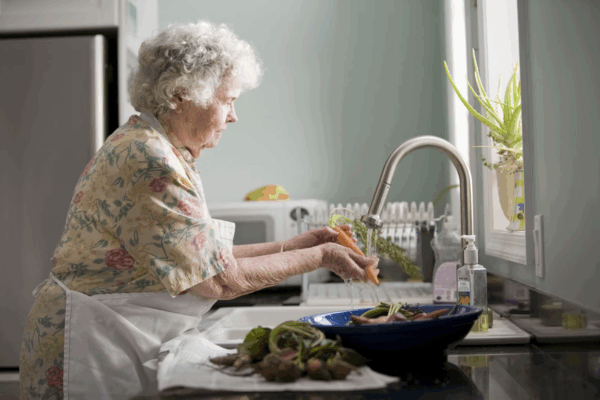As Lehigh Valley parents get older, they may need more help with daily tasks around the home, but that doesn’t mean they have to leave their home. Many seniors want to stay in the place they feel most comfortable, and with a little effort, that can be possible. Taking care of an aging parent at home requires patience, planning, and a few adjustments to make things easier for both them and you.
From simple home improvements to getting outside help when needed, small changes can have a big impact. Knowing what to expect and how to prepare can make a huge difference in making sure they stay safe and happy while living at home.
Source: Unsplash (CC0)
Make the home safe and comfortable
A home that was once easy to move around in can become difficult as someone gets older. Loose rugs, cluttered walkways, and poor lighting can increase the risk of falls. Adding nightlights in hallways, securing rugs with non-slip pads, and keeping floors clear of obstacles can help prevent accidents. Small changes like grab bars in the bathroom and railings on both sides of the stairs can provide extra support.
Furniture placement can also make a big difference. Rearranging a room so there’s enough space to walk easily without bumping into things can make movement safer. If getting up from a chair or bed is a struggle, furniture risers or a lift chair can help. Making sure commonly used items are within easy reach also prevents unnecessary bending or stretching that could lead to injury.
Encourage independence with small adjustments
Aging parents may not want to feel like they are losing control over their daily lives. Simple adjustments can help them continue doing things on their own while staying safe. If reaching for items in the kitchen is difficult, installing pull-down shelves can make things more accessible. Replacing traditional door knobs with lever handles makes opening doors easier for those with arthritis or weaker grip strength.
Smart home devices can also be helpful. Voice-activated assistants can control lights, make phone calls, and set reminders for medication. A simple remote-controlled light switch or a motion-sensor faucet can help them stay independent without needing to ask for help with small tasks. Giving them the ability to do things on their own builds confidence and keeps them engaged in daily routines.
Help with daily tasks without taking over
Caring for an aging parent at home often means helping with everyday tasks like cooking, cleaning, and managing medications. While it’s good to lend a hand, taking over completely can make them feel helpless. Encouraging them to participate in small ways, like stirring ingredients while cooking or folding laundry, helps them stay active and feel useful.
If medication management is overwhelming, using a pill organizer or setting alarms as reminders can make things easier. A large-print calendar with appointments, meal plans, and important reminders in a visible spot can also keep them on track. Instead of doing everything for them, guiding them through tasks with a little support allows them to stay involved in their own care.
Stay connected to reduce loneliness
Aging at home can sometimes feel isolating, especially if mobility issues make it harder to get out. Regular social interaction is important for emotional well-being, so finding ways to keep them connected to family and friends is important. Simple activities like scheduled phone calls, video chats, or inviting neighbors over for coffee can brighten their day.
Encouraging hobbies that keep them engaged, like gardening, knitting, or puzzles, can also help. If they enjoy being part of a group, local community centers often have activities designed for seniors. Social connections help prevent feelings of loneliness, which can have a big impact on their overall health and happiness.
Source: Unsplash (CC0)
Make meal preparation simple and nutritious
Cooking may become difficult as parents age, but a good diet is important for staying healthy. If making meals from scratch is too much, preparing simple, nutritious meals ahead of time can make things easier. Batch cooking and freezing meals in portions allows them to heat up healthy options without much effort.
If grocery shopping is a challenge, delivery services or meal kit subscriptions can provide fresh food without the hassle of going to the store. Keeping healthy snacks like cut-up fruits, nuts, and yogurt easily available encourages better eating habits. Helping them maintain a well-balanced diet without making mealtime stressful keeps them strong and energized.
Consider professional help when needed
Sometimes, caring for an aging parent at home can become overwhelming, and getting outside help may be the best option. Hiring in-home senior care services can provide assistance with personal care, housekeeping, and medical needs. Having a trained professional come in, even for a few hours a week, can take some of the pressure off while making sure your parents get the care they need.
This type of support doesn’t mean losing independence. It allows seniors to stay in their home while still getting help with tasks that may have become too difficult. Whether it’s help with bathing, medication reminders, or meal preparation, professional caregivers can offer the extra support needed to keep them safe and comfortable at home.
Take care of your own well-being
Caring for someone else can be exhausting, both physically and emotionally. It’s important to take breaks and find time to relax. If possible, asking a family member or friend to step in for a few hours can give you much-needed time to rest and recharge. Even short moments of self-care, like reading a book or going for a walk, can make a big difference.
Support groups, both online and in person, can provide comfort and advice from people going through the same thing. Talking to others who understand the challenges of caring for elderly loved ones can make you feel less alone. Taking care of your own health and happiness allows you to be there for your parents without feeling burned out.
At the end of the day, caring for an aging parent at home comes with challenges, but small changes can make a big difference in their comfort and independence. By finding ways to balance their needs with your own well-being, you can create a safe, supportive, and loving environment for them to enjoy.






